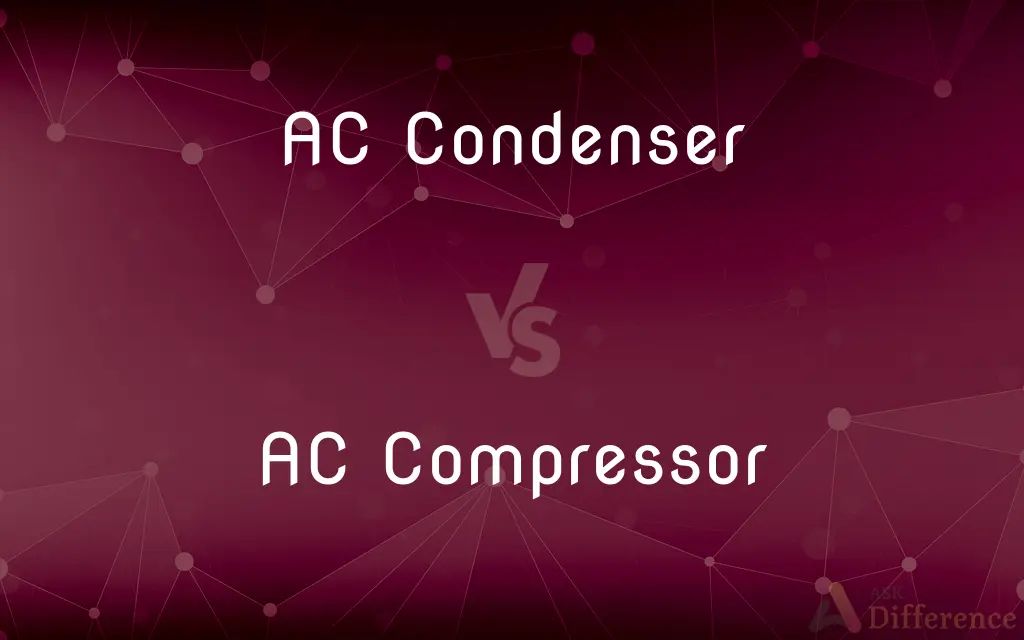AC Condenser vs. AC Compressor — What's the Difference?
By Tayyaba Rehman & Fiza Rafique — Published on March 9, 2024
An AC condenser releases heat from refrigerant into the air, while the AC compressor pressurizes refrigerant, facilitating its flow through the system.

Difference Between AC Condenser and AC Compressor
Table of Contents
ADVERTISEMENT
Key Differences
The AC compressor is integral to an air conditioning system's function, pressurizing the refrigerant, which allows it to absorb heat from the indoor air. In contrast, the AC condenser is where the absorbed heat is expelled to the outdoors. This process is essential for cooling the indoor space efficiently.
Compressors are often considered the heart of the AC system, circulating refrigerant through the system under high pressure. The condenser, on the other hand, acts as a radiator, cooling the refrigerant after it has been heated and pressurized, preparing it to cycle back and absorb more indoor heat.
The efficiency and performance of an AC compressor directly influence the cooling capacity and energy consumption of the air conditioning system. Meanwhile, the condenser’s efficiency affects how effectively the system expels heat to the outdoor environment, impacting the overall cooling process.
AC compressors typically use a motor to compress the refrigerant, which requires significant energy. Condensers, however, rely on a fan to cool the refrigerant, which is less energy-intensive but crucial for maintaining the refrigerant's temperature at optimal levels.
Maintenance requirements for compressors involve checking for leaks, ensuring proper refrigerant levels, and monitoring for signs of wear or failure. Condenser maintenance focuses on cleaning the coils, ensuring adequate airflow, and checking for blockages that impede heat dissipation.
ADVERTISEMENT
Comparison Chart
Function
Pressurizes refrigerant
Releases absorbed heat
Role in AC System
Circulates refrigerant
Cools and condenses refrigerant
Energy Consumption
High, due to compression process
Lower, primarily uses a fan
Maintenance Focus
Checking for leaks, refrigerant levels
Cleaning coils, ensuring airflow
Impact on AC System
Influences cooling capacity and energy use
Affects efficiency of heat expulsion
Compare with Definitions
AC Condenser
Lower energy consumption compared to the compressor.
The AC condenser requires less power as it mainly operates a fan.
AC Compressor
Influences the overall energy consumption of the AC system;
Upgrading to a more efficient AC compressor can lower energy bills.
AC Condenser
Functions similarly to a radiator in a car.
Debris blocking the AC condenser can hinder its performance.
AC Compressor
A device that pressurizes refrigerant for heat absorption;
The AC compressor activates to circulate refrigerant through the system.
AC Condenser
A unit that expels absorbed heat outdoors.
The AC condenser fan helps cool the refrigerant for another cycle.
AC Compressor
Central to the AC system's cooling process;
A malfunctioning AC compressor can significantly reduce cooling efficiency.
AC Condenser
Essential for the refrigerant cooling and condensation process.
A well-maintained AC condenser improves the system's efficiency.
AC Compressor
Consumes more energy due to its mechanical work;
Regular maintenance can keep the AC compressor running efficiently.
AC Condenser
Maintenance involves cleaning and ensuring unobstructed airflow.
Annual cleaning of the AC condenser coils is recommended.
AC Compressor
Requires monitoring for leaks and proper refrigerant levels;
The technician checked the AC compressor for leaks during the service call.
Common Curiosities
What happens if the AC condenser is blocked?
Heat expulsion is hindered, reducing cooling efficiency and potentially causing system overheating.
What does an AC compressor do?
It pressurizes refrigerant, enabling it to absorb heat from inside the building.
How does an AC condenser work?
It releases the absorbed heat from the refrigerant into the outdoor air.
How often should the AC compressor be serviced?
At least annually, but more frequently in high-use scenarios or as specified by the manufacturer.
Can a dirty AC condenser affect energy bills?
Yes, a dirty condenser can reduce system efficiency, leading to higher energy consumption.
How does temperature affect the AC compressor's performance?
Extreme temperatures can strain the compressor, affecting its efficiency and lifespan.
Why is the AC compressor often called the heart of the AC system?
Because it circulates refrigerant through the system, much like a heart pumps blood.
Can an AC system work without a compressor?
No, the compressor is essential for the refrigerant's circulation and heat absorption.
Does the AC compressor affect indoor air quality?
Indirectly, since a poorly functioning compressor can lead to reduced efficiency and moisture removal.
Can I replace just the AC compressor or condenser?
Yes, but it's crucial to ensure compatibility with the rest of the system for optimal performance.
What are common signs of AC condenser issues?
Reduced cooling capacity, overheating, and unusual noises during operation.
What maintenance does an AC compressor require?
Leak checks, refrigerant level monitoring, and general inspections for wear or damage.
Is the AC compressor repair expensive?
Yes, due to its complexity and the cost of parts, compressor repair can be expensive.
How can I tell if my AC condenser is failing?
Look for signs like reduced cooling, longer cooling times, or strange noises from the unit.
What role does the condenser play in energy efficiency?
It directly impacts how effectively the system expels heat, affecting overall energy use and efficiency.
Share Your Discovery

Previous Comparison
Mycelia vs. Hyphae
Next Comparison
Amazon vs. Amazon MarketplaceAuthor Spotlight
Written by
Tayyaba RehmanTayyaba Rehman is a distinguished writer, currently serving as a primary contributor to askdifference.com. As a researcher in semantics and etymology, Tayyaba's passion for the complexity of languages and their distinctions has found a perfect home on the platform. Tayyaba delves into the intricacies of language, distinguishing between commonly confused words and phrases, thereby providing clarity for readers worldwide.
Co-written by
Fiza RafiqueFiza Rafique is a skilled content writer at AskDifference.com, where she meticulously refines and enhances written pieces. Drawing from her vast editorial expertise, Fiza ensures clarity, accuracy, and precision in every article. Passionate about language, she continually seeks to elevate the quality of content for readers worldwide.










































